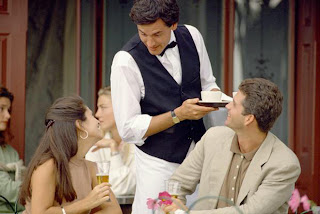I recently visited
one of our clients. He owns a restaurant/bar. That is a tough business under
the best of circumstances. It is a
business where almost all your profit comes from paying attention to the
nickels and dimes.
Is there
anything new out there, he asked?
We talked
about the IRS’ recent interest in employee tips and gratuities. What is the
difference?
- A tip is an amount determined by the patron
- A service charge is an amount agreed upon by the restaurant and patron
The IRS has
long defined a tip as:
- Paid free from compulsion
- Determinable by the customer
- Not dictated by the restaurant/employer
- The recipient of which is identified by the customer
You may know
that restaurant employees are paid a lower minimum wage, as a substantial part
of their income is expected to come from tips. The employees are supposed to
report their tips to the restaurant, which in turn withholds the employee’s share
of the taxes. The restaurant also pays employer FICA on the base wages and tips.
The IRS has
long believed that there exists substantial noncompliance with tip reporting by
restaurant employees, and it has rolled out a number of “programs” over the
years with the intent of increasing compliance. I have been through several of these,
and my conclusion is that the IRS just wants money, even if it takes a work of
fiction to get there. For example, if the IRS feels that the cash tip rate is
too low, they will simply propose a higher rate, and call upon the restaurant
(which then means me) to prove otherwise. Failure to do so means the restaurant
is writing a tidy check for those actual taxes on proposed tips.
It is
unfortunately too common that a server will be under-tipped if he/she is
serving a large party. As a defense mechanism, many restaurants have imposed a
service charge policy (also known as an auto gratuity or “auto-grat”) on that
table or tables. The policy has worked fine for years.
But not for the
IRS. They have recently clarified that they don’t believe auto-grats count as a
tips, as the customer does not have the option of changing the amount or
directing who is to receive it. I have to admit, the IRS has a point. However, are
they making things worse by pressing the point? Let’s go through a few issues:
- The auto-grat will be on the server’s paycheck, rather than cashed out at the end of the shift. This is not a big deal in the scheme of things – except perhaps to the server.
- Restaurants are allowed to claim a tax credit for employer FICA paid on tips in excess of the amount necessary to get a server to minimum wage.
a. Reduce the amount considered to be
tips and you reduce the credit available to the restaurant.
b. Meaning more tax to the restaurant.
- An auto-grat is considered revenue to the restaurant. Tips are not. States with a gross revenue tax – such as Ohio with its CAT – will now tax those auto-grats.
a. Meaning more tax to the restaurant.
- Following on the same vein as (3), the customer will pay more sales tax, as the auto-grat is included in sales.
a. Meaning more tax to the customer.
- How does one (I don’t know: say my accounting firm) figure out what rate of pay to use if the employee works overtime?
a. Remember, service charges are
resetting the base rate of pay.
b. What if they server works tips and
auto-grat tables over the course of one shift? Do they have one rate of pay or
two? How would you even calculate this?
- Let’s throw a little SALT (State And Local Tax) into the mix: some states do not follow the federal definitions. For example, New York will consider auto-grats to be considered tips if they are separately stated on the receipt or invoice. New Jersey and Connecticut follow this line also.
a. The good thing is that auto-grats
will not be subject to New York sales tax.
b. The bad thing is the accounting required
to figure this out.
How long do you
think it will be before the attorneys eviscerate some restaurant chain for
violations of FLSA and overtime regulations? Remember, a service charge can
change a server’s base pay, something a tip cannot do. On the other hand, the
odds of overtime under the current economy are pretty low.
What about
discrimination? How long before someone sues for being scheduled insufficient/excessive
service -charge/non-service-charge shifts?
You know what I would do? I would do away with
service charges altogether. I am not bringing that tiger to the party. Tips
only at my restaurant.
Is it good
for the servers? Since when does any of this care whether it is good for the
employee?
It is about
one thing: more money to the IRS. There may have been a time when I would have
been sympathetic to the government’s position, but in this day of credit and
debit cards, I am cynical about how much “unreported” income there is left to
squeeze out of this turnip. I am also concerned that some restaurants may
impose a service charge and then keep a portion of it for themselves rather
than pass it along in full to the servers and others. I am unhumored by the IRS, but I would be
beyond unhumored by a restaurant that did that to its employees.

No comments:
Post a Comment